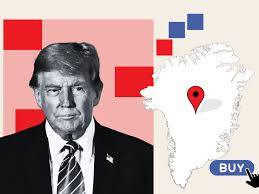Trump's Enduring Quest for Greenland: Unpacking the National Security Imperative.
Donald Trump's recent remarks have reignited the debate about the United States' interest in purchasing Greenland, a self-ruling territory of Denmark. The former President's assertion that US ownership and control of the island is an "absolute necessity" for national security has sparked intense discussion about the motivations behind this pursuit.
The United States has a long history of interest in Greenland, dating back to the 19th century. In 1867, Secretary of State William H. Seward considered purchasing both Greenland and Iceland from Denmark ¹. This interest was rekindled in the mid-20th century, with the US offering Denmark $100 million in gold bullion for Greenland in 1946. The proposal was declined, but the US continued to maintain a military presence on the island.
Trump's renewed interest in purchasing Greenland is reportedly driven by concerns about national security and the island's strategic location. Greenland's proximity to the Arctic Circle and its access to the North Atlantic make it a crucial location for military operations and surveillance. The US has long been concerned about the potential for Russian and Chinese expansion in the Arctic region, and owning Greenland would provide a significant strategic advantage.
However, Denmark has consistently maintained that Greenland is not for sale. The Danish government has emphasized its commitment to Greenland's autonomy and self-governance, and has rejected any proposals that would compromise the island's sovereignty.
Despite these rebuffs, the US has continued to cultivate its relationship with Greenland. In 2020, the US reopened its consulate in Nuuk, Greenland's capital, and has provided significant funding for infrastructure development and economic initiatives on the island.
The implications of US ownership of Greenland would be far-reaching. It would likely lead to increased military presence and investment in the island's infrastructure, as well as potential conflicts with Denmark and other European nations. Furthermore, it would also raise important questions about the rights and interests of Greenland's indigenous population, the Inuit.
In the end, Trump's enduring interest in purchasing Greenland reflects the US's long-standing strategic interests in the region. While Denmark has maintained its opposition to any sale, the US is likely to continue pursuing its goals through diplomatic and economic means. As the geopolitical landscape continues to evolve, the fate of Greenland remains a critical issue with significant implications for national security, international relations, and the rights of indigenous peoples.



No comments yet
Be the first to share your thoughts!